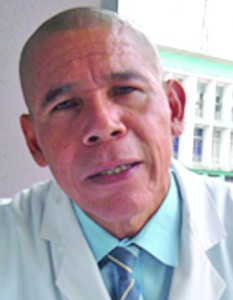
Committee on Appointments Chairman, Dr George Norton is expected to present a report in the National Assembly on Monday relating to the reorganisation of the Ethnic Relations Commission (ERC).
Dr Norton told Guyana Times International on Wednesday that the report will entail plans to add three more members to the legal structure of the ERC. He explained that the committee is moving to increase the number of appointees from seven to 10, and so include a representative from an Afro-Guyanese, Indo-Guyanese and Amerindian group. That new category will be referred to as cultural/ethnic.
The A Partnership for National Unity (APNU) Member of Parliament said significant progress was made over the past few months by the appointive committee to address this issue. “There was no difficulty really in arriving at the stage where we can put a report to the House and we hope it would get the two-thirds majority,” he said.
Dr Norton added that the committee has removed the Inter-Religious Organisation (IRO) from the committee and placed the culture/ethnic group in its slot.
Detailed information
The report to be submitted on Monday provides detailed information on the work of the committee and will explain how the committee came to the decision to remove the IRO and replace it with another group. He said, “The ERC comprises certain entities and we had to have some additions, subtraction and changes… we also had to search to find if some of the religious and other organisations were still active.”
At present, the seven representatives comprise one member from the Christian religion, Hindu religion, Muslim religion, labour movement, private sector organisations, youth organisations, and women organisations. As it relates to the religious bodies, nine organisations falls under the Islamic group; 13 under the Hindu group, 36 under the Christian group, 20 under the labour movement group, 26 under the private sector group, 42 under the youth group, and 22 under the women group.
However, with the additional three positions, five Amerindian bodies, eight African bodies and three Indian bodies will be represented. All of the said entities that fall under the new category will be written to immediately after the passage of the motion, by the Clerk of the National Assembly Sherlock Isaacs, and instructed to meet as a group to select their nominees and send back that information to Parliament.
A deadline will be set by the clerk for the receipt of the nomination. The nominees that is chosen to represent these bodies are expected to be “competent to contribute positively to work of the commission and… committed to ensuring that it discharges all of its functions”, according to the National Assembly.
Dr Norton said, “We hope that nobody will judge the function of the ERC that should form now on any past commission that existed before.”
The ERC has been functioning without commissioners and a chairman for some time. While staff is attached to the commission, there is little known about the work they have been doing. The opposition, during the 2012 and 2013 national budgets, had cut funding for the constitutional body, but this was later restored through a court order.
The ERC was established under the Herdmanston Accord. It works with persons and agencies to promote harmonious ethnic relations. The commission also deals with complaints, promotes training in racial harmony, and fosters a sense of security among all ethnic groups.



